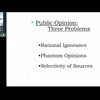slowed
Parental union dissolution and the gender revolution
Social Forces Abstract This study investigates two concurrent trends across Europe and North America: the increasing instability of parental unions and men’s rising contributions to household work. Beca
Sex Selection for Daughters: Demographic Consequences of Female-Biased Sex Ratios
Population Research and Policy Review 41, p. 1619–1639 Abstract Modern fertility techniques allow parents to carry out preimplantation sex selection. Sex selection for non-medical purposes is legal in m
Political Double Standards in Reliance on Moral Foundations
Judgment abd Decision Making Abstract Prior research using the Moral Foundations Questionnaire (MFQ) has established that political ideology is associated with self-reported reliance on specific moral f
Social dominance orientation and climate change denial: The role of dominance and system justification
Personality and Individual Differences, Volume 86, pp. 108-111.doi.org/10.1016/j.paid.2015.05.041 Abstract Extending previous research, we examined whether the relation between social dominance orientat
James Fishkin: Is Deliberation an Antidote to Extreme Partisan Polarization? Reflections on “America in One Room”
AbstractIs Deliberation an Antidote to Extreme Partisan Polarization? Reflections on “America in One Room” Register here to join the seminar This talk is positioned at the intersectionof two literatures

James Fishkin: Is Deliberation an Antidote to Extreme Partisan Polarization?
James Fishkin: Is Deliberation an Antidote to Extreme Partisan Polarization? Reflections on “America in One Room” This talk is positioned at the intersectionof two literatures: partisan polarizatio
New scientific model can predict moral and political development
Nature Human Behavior, one of the most influential social science journals, is now publishing a groundbreaking study from a Swedish team of researchers that answers several critical questions on how public opinion changes on moral issues, such as: How come today’s conservatives are more liberal than yesterday’s liberals? Why has the public opinion in large parts of the world shifted so rapidly in favor of gay and lesbian rights, but been virtually unchanged on other contested issues such as abortion rights? And is it possible to create a scientific model that can predict public opinion changes on moral issues?
Denial of anthropogenic climate change: Social dominance orientation helps explain the conservative male effect in Brazil and Sweden
Personality and Individual Differences, Volume 98, Pp. 184-187. doi.org/10.1016/j.paid.2016.04.020 Abstract Political conservatives and males are more likely to deny human influence on climate change. In
Ideology and climate change denial
Personality and Individual Differences, Volume 70, Pages 62-65.doi.org/10.1016/j.paid.2014.06.030 Abstract Examining the relation between ideological variables and climate change denial, we found social
Students’ occupational aspirations: Can family relationships account for differences between immigrant and socioeconomic groups?
Child Development Abstract Immigrant background and disadvantaged socioeconomic background are two key predictors of poorer school achievement in Europe. However, the former is associated with higher wh








